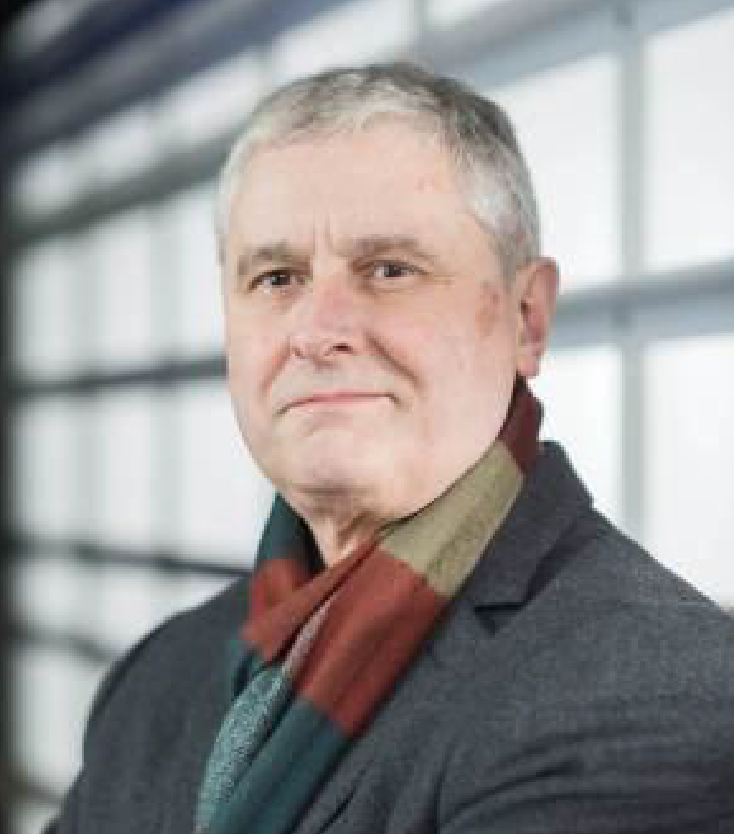Timothy Cheek
Office Hours
Mon 4:30-5:30, Wed 3:30-4:30Research Expertise
Geographic Expertise
About
Timothy Cheek is a Professor with the School of Public Policy and Global Affairs and Department of History, Louis Cha Chair in Chinese Research, and C0-Director of the Centre for Chinese Research at the Institute of Asian Research (IAR). He has been a professor at UBC since 2002, teaching in the IAR’s former Asian policy program and now in the Master of Public Policy and Global Affairs (MPPGA) program. His research, teaching and translating focus on the recent history of China, especially the role of Chinese intellectuals in the twentieth century and the history of the Chinese Communist Party.
His books include The Chinese Communist Party: A Century in Ten Lives (2021) with Klaus Mühlhahn and Hans J. van de Ven, The Intellectual in Modern Chinese History (2015), Living with Reform: China Since 1989 (2006), Mao Zedong and China’s Revolutions (2002) and Propaganda and Culture in Mao’s China (1997).
He is a 2023 Fellow of the Royal Society of Canada (RSC) in the Academy of Arts and Humanities.
Teaching
Research
Research Interests
- 20th century Chinese history
- the history of the Chinese Communist Party
- the role of intellectuals in public life in China
Research
Contemporary Thought and Society in China. The ideas, debates, writings, and roles of intellectuals in contemporary China with a focus on “certified knowledge” and institutions of intellectual life. Most recent publication in this stream: The Intellectual in Modern Chinese History(Cambridge University Press, 2015).
Mao Zedong. Translating and editing Mao texts with Stuart Schram for vol. VIII of Mao Zedong’s Road to Power, being the complete works of Mao in English for 1942-1945. Published in July 2015.
Thinking about Chinese Thinking. An interdisciplinary project to coordinate the disciplines of history, social psychology, and political theory in the study of Sinophone discourse about public issues and ideologies, such as liberalism. Current SSHRC project on “Reading and Writing the Chinese Dream” focuses on public intellectuals in China today (co-directed with Joshua A. Fogel, York University, and David Ownby, University of Montreal).
Public Engagement
The Cato Institute (Washington, DC) Online Public Policy Forum on Oct. 16, 2020, “China’s New Authoritarian Ideology”.
“The Party History Study and Education Campaign,” in Party Watch Annual Report 2021: Past as Prologue—Studying Party History for Xi’s New Era (Center for Advanced China Research, Washington, DC, 2022), 27-34.
“Make China Marxist Again,” with David Ownby, Dissent, 65:4 (Fall 2018), 71-77.
Publications
Books
| Citation | Book/Journal Cover |
|---|---|
| The Chinese Communist Party: A Century in Ten Lives, ed. with Klaus Mühlhahn & Hans van de Ven (UK: Cambridge University Press, 2021) | 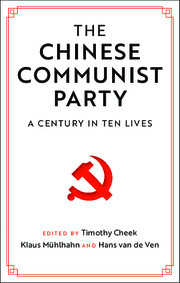    |
| Voices from the Chinese Century: Public Intellectual Debate from Contemporary China, ed. with David Ownby & Joshua A. Fogel (NY: Columbia University Press, 2020) | 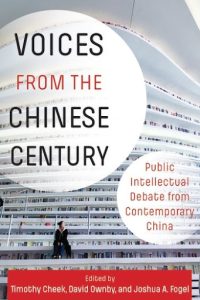    |
| T. Cheek. 鄧拓:毛時代的中國文人. 香港:Oxford University Press, 2016. This is the Chinese translation by Guo Li and Huang Xin of Propaganda and Culture in Mao’s China (1997). The Chinese title translates as “Deng Tuo: A Chinese Literatus in Mao’s Time.” 作者自謙說現在出中譯本的價值也許只在於它的方法和材料。齊慕實師從孔飛力(Philip Kuhn),在此他試圖把孔在清史研究中使用的嚴格的文本分析和社會學方法,運用到現代中國研究中來,通過對鄧拓這樣一位悲劇性現代文人──忠誠的毛追隨者和作為政治宣傳筆桿子的高級幹部──的研究,能與中文讀者展開專業性的對話。 | 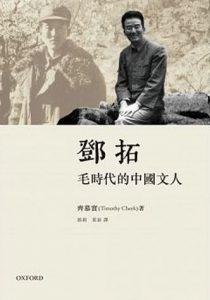    |
| T. Cheek. The Intellectual in Modern Chinese History. New York: Cambridge University Press, 2015. This vivid narrative history of Chinese intellectuals and public life provides a guide to making sense of China today. Timothy Cheek presents a map and a method for understanding the intellectual in the long twentieth century, from China’s defeat in the Sino-Japanese war in 1895 to the ‘Prosperous China’ since the 2008 Beijing Olympics. Cheek surveys the changing terrain of intellectual life over this transformative century in Chinese history… | 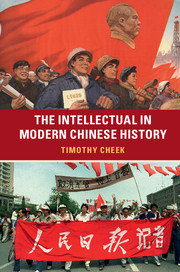    |
| S. Schram; T. Cheek. Mao’s Road to Power: Revolutionary Writings, 1912-1949, Vol. VIII: 1942-August 1945. London: Routledge, 2015.This eighth volume covers the period 1942 to 1945 when Mao asserted his status as the incarnation and symbol of the Chinese Revolution and the sinification of Marxism-Leninism. | 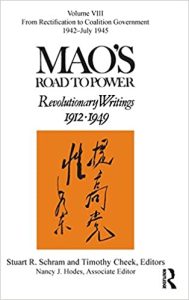    |
| T. Cheek. A critical introduction to Mao. New York: Cambridge University Press, 2010.”Mao Zedong’s political career spanned more than half a century. The ideas he championed transformed one of the largest nations on earth and inspired revolutionary movements across the world. Even today Mao lives on in China, where he is regarded by many as a near-mythical figure, and in the West, where a burgeoning literature continues to debate his memory. In this book, leading scholars from different generations and around the world offer… | 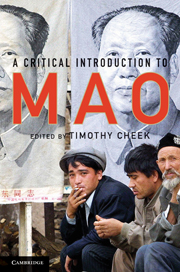    |
| T. Cheek. Living with reform: China since 1989. New York: Zed Books, 2006. | 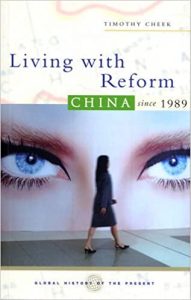    |
| L. Li; H. Jiang; T. Cheek. Small well lane: a contemporary Chinese play and oral history = [Xiao jing hu tong]. Ann Arbor: University of Michigan Press, 2002. | 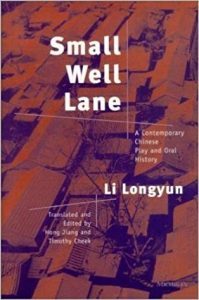    |
| T. Cheek, Mao Zedong and China’s Revolutions: A Brief History with Documents. Boston: Bedford Books, 2002. | 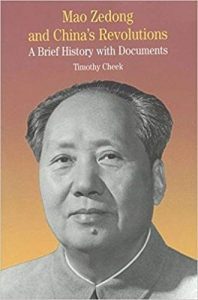    |
| J.D. Lindau; T. Cheek. Market economics and political change: comparing China and Mexico. Lanham, MD: Rowman & Littlefield Publishers, 1998. | 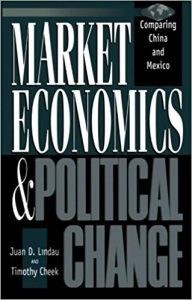    |
| T. Cheek; T. Saich. New perspectives on state socialism of China. Armonk, N.Y: M.E. Sharpe, 1997. | 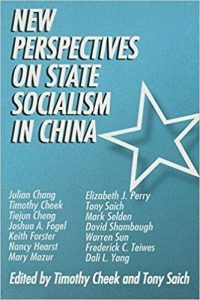    |
| T. Cheek. Propaganda and culture in Mao’s China: Deng Tuo and the intelligentsia. New York: Oxford University Press, 1997. | 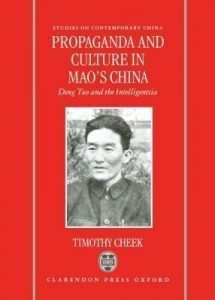    |
| Q. Dai; D.E. Apter; T. Cheek; J. Song. Wang Shiwei and “Wild lilies”: rectification and purges in the Chinese Communist Party, 1942-1944. Armonk, New York: M.E. Sharpe, 1994. | 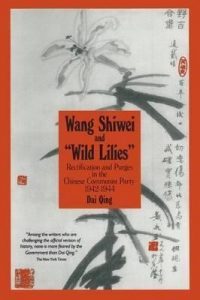    |
| Z. Mao; R. MacFarquhar; T. Cheek; E. Wu; M. Goldman; B.I. Schwartz. The secret speeches of Chairman Mao: from the hundred flowers to the great leap forward. Cambridge, Mass: Council on East Asian Studies/Harvard University, 1989. |
Media Commentary
| Citation |
|---|
| “西方学者齐慕实(Timothy Cheek):从十场人生看中共一百年,” 时事大家谈, 美国之音, July 5, 2021. Western Scholar, Timothy Cheek: “A Century of the CCP in Ten Lives”, Talks on Current Affairs, Voice of America (Mandarin service).] |
| The CCP from Mao to Xi: Timothy Cheek Looks at the CCP,” USC US-China Institute (Los Angeles) video podcast on Youtube, 14-20 July 2021. |
| “Reading and Writing the Chinese Dream: introducing a project,” in “Thinking China” at The China Story website of the Australian Centre on China in the World, posted 26 Jan. 2016. |
| Interviewed for “China steps up war on dissent,” The guardian Weekly, 14-20 August 2015. |
| “China’s ‘slow-motion revolution’ has stalled,” Op-Ed with Jeffrey Wasserstrom, Los Angeles Times, June 4, 2015. |
| “Chinese Propaganda in Historical Perspective: Five Terms to Consider,” China Policy Institute Blog (University of Nottingham) 11 May, 2015. |
| “Is China’s Collapse Really Inevitable?”, Asia Pacific Foundation of Canada commentary, 16 March 2015. |
| “The China Puzzle” interview in The Storm (Singapore), March 13, 2015. |
| “Is the Cultural Revolution Relevant in Modern China?” interview in Perspectives@SMU (Singapore), 25 February 2015. |
| “China on Our Mind: Commentary on ‘The Secrets of Chinatown’”, film screening and discussion at Cinematheque, Vancouver, 12 January 2015. |
| CBC TV news interview (Ian Hanomansing), on China and Canadian security, 9 October 2012. |
| “Hard Days for China’s Public Intellectuals Will Likely Get Harder,” Asia Pacific Memo (UBC), 14 April 2011. |
| “A Critical Introduction to Mao” (text & video), Asia Pacific Memo (UBC), 3 November 2010. |
| “China’s Directed Public Receives Nobel Peace Prize” (text & video), Asia Pacific Memo (UBC), 8 Oct. 2010. |
| “The ‘Directed Public Sphere’ of China’s Public Intellectuals,” Asia Pacific Memo (UBC), 19 August 2010. |
| “Missing Footage at the AAS: Chinese Scholar Prevented from Attending,” The China Beat, 1 April 2010. |
Articles/Book Chapters
| Citation | Book/Journal Cover |
|---|---|
| “Xi Jinping’s Counter-Reformation: The Reassertion of Ideological Governance in Historical Perspective,” Journal of Contemporary China, Vol. 30, Issue 132 (November 2021), 875-887. | 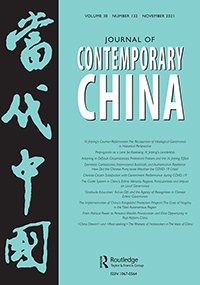    |
| “Mapping the intellectual public sphere in China today,” first author with David Ownby & Joshua Fogel, part of a “research dialogue” section of six essays in, China Information, 32:1 (March 2018), 107-120. | |
| “The Reform Era as History,” in Michael Szoyni, ed., A Companion to Chinese History (Oxford: Blackwell, 2017), pp. 191-203. | |
| “Ignoring the Ramparts: John Friedmann’s Dialogue with Chinese Urbanism and Chinese Studies,” for the volume, Insurgencies and Revolutions, Haripriya Rangan, Mee Kam Ng, Libby Porter, and Jacquelyn Chase, eds. (London: Routledge, 2016), pp. 253-58. | |
| “Making Maoism: Ideology and Organizations in the Yan’an Rectification Movement, 1942-44,”in Knowledge Acts in Modern China: Ideas, Institutions, and Identities, eds. Robert Culp, Eddy U, and Wen-hsin Yeh (Berkeley: University of California Institute of East Asian Studies, 2016), pp. 304-27. | |
| “Reform and Rebuilding, 1976-1988,” in Jeffrey Wasserstrom, ed., Oxford Illustrated History of Modern China (Oxford: Oxford University Press, 2016), pp. 226-49. | |
| “Attitudes of Action: Maoism as Emotion in Political Theory,” in Chinese Thought as Global Theory: Diversifying Knowledge Production in the Social Sciences and Humanities, ed., Leigh Jenco (Albany: NY: SUNY Press, 2016), pp. 75-100. | |
| , “Mao and Maoism”, in The Oxford Handbook of Communism, Oxford: Oxford University Press, 2014, pp. 90-115. | |
| , “Chinese Socialism as Vernacular Cosmopolitanism”, Frontiers of History in China, vol. 9, no. 1, pp. 2-28, 2014. | |
| , “Citizen Intellectuals in Historical Perspective: Reflections on Callahan’s ‘Citizen Ai’”, Journal of Asian Studies, vol. 73, no. 4, pp. 921-25, 2014. | |
| , “The Importance of Revolution as an historical topic”, Journal of Modern Chinese History, vol. 7, no. 2, pp. 250-53, 2013. | |
| , “The Worlds of China’s Intellectuals”, in China In and Beyond the Headlines, Lanhan, MD: Rowman & Littlefield, 2012. | |
| , “Of Leaders and Governance: How the Chinese Dragon Got Its Scales,” a review essay on Ezra Vogel, Deng Xiaoping and the Transformation of China (Harvard, 2011)”, Cross-Currents: East-Asian History and Culture Review, vol. 2, 2012. |     |
| , “The End of Intellectuals: 60 Years of Service, Subversion, and Selling in China”, in The People’s Republic of China at 60: An International Assessment, Cambridge: Harvard University Asia Center, 2011, pp. 339-56. | |
| , “Shengshi, Chinese Values and Han Yu”, China Heritage Quarterly, no. 26, 2011. | |
| , “The Multiple Mao’s of Contemporary China”, Harvard Asia Quarterly, vol. XI:2-3, no. Spring/Summer 2008, pp. 14-25, 2008. | |
| , “The New Chinese Intellectual: Globalized, Disoriented, Reoriented”, in China’s Transformations: The Stories Beyond the Headlines, Lanham, MD: Rowman & Littlefield, 2006, pp. 265-284. | |
| , “Xu Jilin and the Thought Work of China’s Public Intellectuals”,The China Quarterly, pp. 401-420, 2006. | |
| , “Historians as Public Intellectuals in Contemporary China”, inChinese Intellectuals Between the State and Market, London: Routledge, 2004, pp. 204-222. | |
| , “Mao Zedong and China’s Revolutions: A Brief History with Documents”, Europe-Asia Studies, vol. 55, pp. 1347-1348, 2003. | |
| , “Beyond Exceptionalism: China’s Intellectuals and America from Heroes to Allies”, in China Beyond the Headlines, Lanham: Rowman & Littlefield, 2000, pp. 121-145. | |
| , “Introduction: A Cross-Cultural Conversation on Li Zehou’s Ideas on Subjectivity and Aesthetics in Modern Chinese Thought”, Philosophy East and West, vol. 49, pp. 113-119, 1999. | |
| , “From Market to Democracy in China: Gaps in the Civil Society Model”, in Market Economics & Political Change: Comparing China and Mexico, Lanham: Rowman & Littlefield, 1998, pp. 219-245. | |
| , “From Priests to Professionals: Intellectuals and the State under the CCP”, in Popular Protest and Political Culture in Modern China: Lessons from 1989, Boulder: Westview Press, 1992, pp. 124-45. |
Reference Entries
| Citation |
|---|
| , “Establishment Intellectual”, Oxford Bibliographies in Chinese Studies. Oxford University Press, New York, 2015. |
Courses Taught
Courses taught 2016W
| Course | Description |
|---|---|
| Global Public Policy 508 Policy in Context | Policy in Context [P&E Foundations of Public Policy] provides students with critical thinking and tools drawn from liberal arts learning to provide a path towards inter-cultural communication skills, entrepreneurship, and effective community engagement in policy work. It provides students with analytical skills with which to reflect on and challenge assumptions built into policy contexts, to gather information, and work in cooperation with various stakeholders. We aim to produce policy entrepreneurs capable of cross disciplinary and cross cultural dialogue, who can make use of contingency and reflexivity in addressing real-world policy issues. |
| History 270A (101) China in the World | This course places the long and complex Chinese experiences in the wider context of world and global history. Its goals are two-folds: to encourage students to identify and explore the multiple and intricate connections “China” has forged throughout its history, and to help students build on their skills of reading, thinking, and writing critically about the past. Open to all interested students. This course will also introduce students to the methods of historical practice, including primary-source analysis, historical writing, library and research skills, and public history. HIST 270 will introduce students to the methods of historical practice, including primary-source analysis, historical writing, library and research skills, and public history. |
| History 586D (101) Topics in Intellectual History | Topics in Intellectual History: Mao and Memory |
Teaching and Supervision
GPP 508: Philosophical and Ethical Foundations for Public Policy
HIST 270A: China in the World
HIST 490Q: REVOLUTION! Twentieth Century Political and Social Revolutions
HIST 558: Intellectuals and Public Life in Eastern Asia (not offered 2014-15)
HIST 563: Methodology and Sources in Chinese History (not offered 2014-15)
IAR 515R Policy in Context
Graduate Reading Courses on various topics in modern Chinese history (by arrangement)
Check this year’s course schedule for currently offered courses.
IAR Faculty
